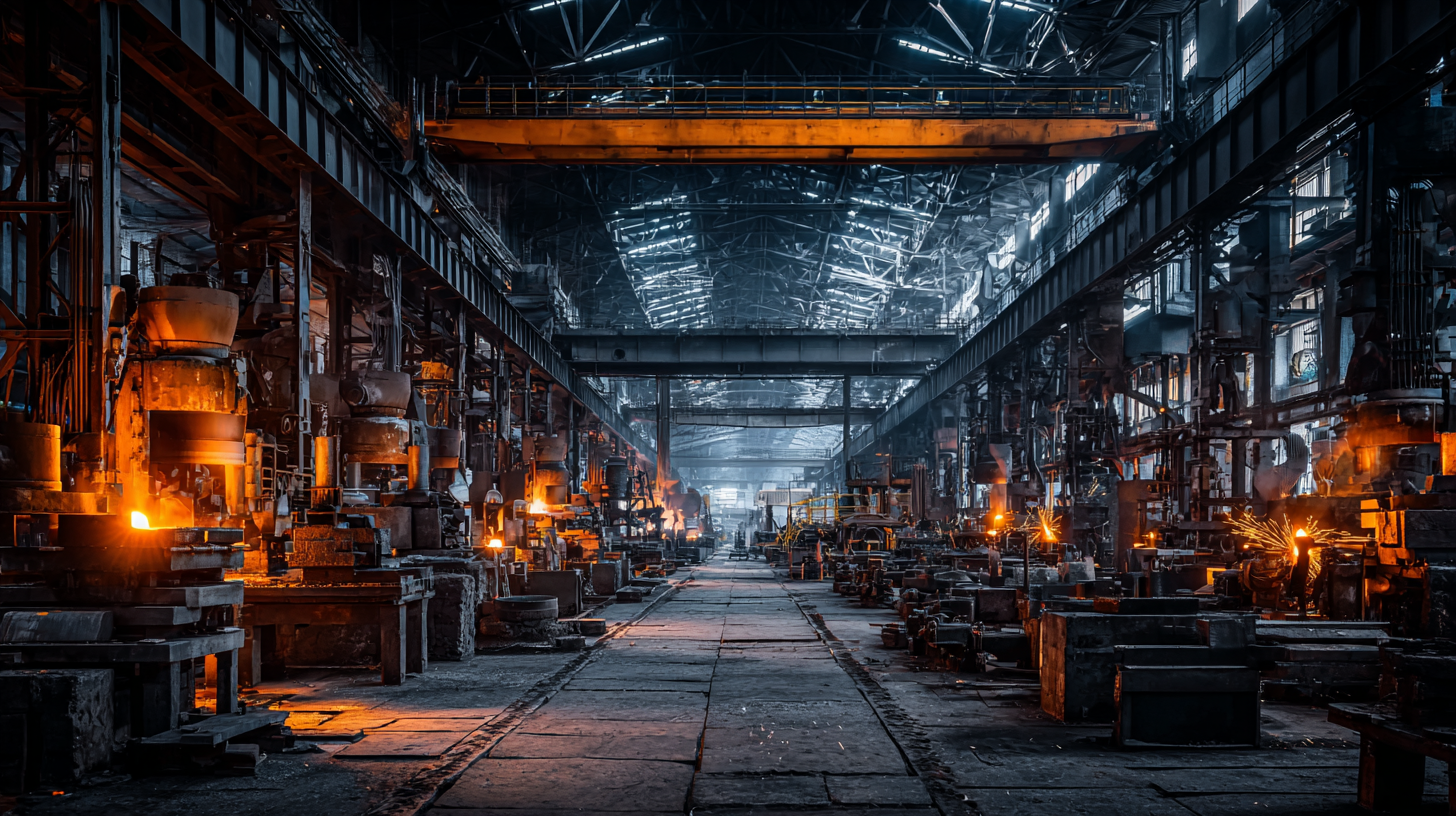
10 Best Manufacturers You Should Know in 2023
In an ever-evolving global market, the role of manufacturers is crucial in driving innovation and meeting consumer demands. According to a recent report by the National Association of Manufacturers (NAM), the manufacturing sector contributes over $2.3 trillion to the U.S. economy, accounting for 8.5% of the gross domestic product (GDP) and employing around 12.8 million workers. As industries adopt advanced technologies such as automation, artificial intelligence, and sustainable practices, the landscape of manufacturing is reshaped, making it essential to identify key players shaping this transformation. This blog outlines the 10 best manufacturers you should know in 2023, reflecting on their impact, innovation, and the crucial role they play in the global supply chain. Understanding these manufacturers will provide valuable insights into current trends and future directions in the manufacturing sector.

The Importance of Selecting the Right Manufacturers in Today's Supply Chain
In today's increasingly interconnected world, selecting the right manufacturers is paramount for maintaining a competitive edge in the supply chain. The importance of choosing reliable manufacturing partners stems from the direct impact they have on product quality, cost efficiency, and delivery timelines. With supply chains often stretched across global networks, even a minor disruption caused by a manufacturer can lead to significant setbacks. Therefore, businesses must prioritize partnerships with manufacturers who not only share their values but also demonstrate a strong commitment to quality, sustainability, and responsiveness.
Moreover, as market demands evolve, the ability to adapt quickly becomes a key differentiator. Manufacturers that utilize advanced technologies and lean practices can provide businesses with the agility needed to respond to shifting consumer preferences. Collaboration with innovative manufacturers fosters a proactive approach to problem-solving, enabling companies to stay ahead of the curve and mitigate risks. By understanding the critical role manufacturers play in the supply chain ecosystem, businesses can make informed decisions that ultimately drive growth and enhance customer satisfaction.
Top 10 Manufacturers Revolutionizing Industry Standards and Practices
In 2023, numerous manufacturers are stepping up to revolutionize industry standards and practices, showcasing remarkable innovation and adaptability. These top emerging brands across various sectors are not just improving products; they are redefining the way industries operate. By integrating advanced technologies and sustainable practices, these companies are setting new benchmarks, ensuring that efficiency and sustainability go hand in hand.
One notable area of transformation is in education, where companies are leveraging technology to enhance learning experiences. These firms are introducing creative solutions that foster interactive and personalized education, catering to the diverse needs of students. By emphasizing the importance of quality education, they are empowering the next generation and equipping them with the necessary skills to thrive in a rapidly changing world. This shift not only benefits learners but also prepares a skilled workforce ready to meet future challenges.
Moreover, the agricultural sector is witnessing a similar wave of innovation. Manufacturers are developing advanced herbicides that promote sustainable agriculture while ensuring effective crop protection. These companies are at the forefront of environmentally friendly practices, reflecting a commitment to responsible farming. As they embrace innovative solutions, these manufacturers are transforming traditional practices and contributing to a greener planet. In this evolving landscape, staying informed about these leading brands is crucial for anyone looking to understand the future of industries globally.

Case Studies: Successful Applications of Innovative Manufacturing Solutions
In the ever-evolving landscape of manufacturing, innovative solutions are redefining how products are conceived and produced. One compelling case study is that of a leading automotive manufacturer that integrated advanced robotics into its assembly lines. By employing collaborative robots, or cobots, the company not only enhanced productivity but also ensured higher precision in assembling complex components. This integration allowed human workers to focus on more intricate tasks, ultimately leading to reduced production time and costs, while significantly improving the quality of the final product.
Another noteworthy example comes from a textile manufacturer that adopted smart textile technology. By utilizing IoT-enabled machines, they achieved real-time monitoring of fabric quality throughout the production process. This innovation allowed for immediate adjustments and minimized waste, exemplifying how data-driven manufacturing solutions can lead to both economic savings and sustainable practices. Such successful applications highlight the importance of staying ahead in a competitive market by embracing cutting-edge technologies, ensuring that manufacturers not only meet but anticipate customer demands.
Impact of Technology and Automation on Manufacturing Efficiency
In 2023, the manufacturing landscape has dramatically transformed due to the rapid advancement of technology and automation. Companies that have embraced these changes are witnessing significant improvements in efficiency, productivity, and overall output. Automation tools, such as robotics and artificial intelligence, streamline production processes, reduce human error, and enable manufacturers to respond more swiftly to market demands. This technological shift allows for a more flexible production environment where manufacturers can quickly adapt to changes, resulting in increased competitiveness.
To maximize the benefits of technology in manufacturing, companies should consider adopting smart manufacturing practices. For instance, integrating IoT devices can provide real-time data insights, allowing for proactive decision-making and optimized resource allocation. Additionally, investing in employee training ensures that the workforce is skilled in using new technologies, which can lead to higher job satisfaction and retention.
Another tip for enhancing manufacturing efficiency is to implement predictive maintenance strategies. By utilizing sensors and analytics, manufacturers can anticipate equipment failures before they occur, minimizing downtime and maintenance costs. This proactive approach not only boosts productivity but also extends the lifespan of machinery, further reinforcing the importance of technology in modern manufacturing processes.
10 Best Manufacturers You Should Know in 2023 - Impact of Technology and Automation on Manufacturing Efficiency
| Manufacturer Type | Innovation Focus | Technology Utilized | Automation Level | Estimated Efficiency Improvement (%) |
|---|---|---|---|---|
| Aerospace | Advanced Materials | AI & Machine Learning | High | 25% |
| Automotive | Electric Vehicles | Robotics | Medium | 30% |
| Consumer Electronics | Smart Devices | IoT Technology | High | 20% |
| Pharmaceutical | Biotech Integration | Data Analytics | Medium | 35% |
| Food & Beverage | Sustainability | Automation Systems | High | 40% |
| Textiles | Smart Fabrics | CAD Software | Medium | 15% |
| Machinery | Precision Engineering | CNC Technology | High | 28% |
| Construction | Smart Building | Augmented Reality | Low | 10% |
| Mining | Sustainable Practices | Drones & Sensors | Medium | 22% |
Industry-Specific Insights: Tailoring Production to Market Demands in 2023
In 2023, manufacturers must adapt their production strategies to meet evolving market demands. A recent report by McKinsey highlights that nearly 70% of manufacturers are investing in digital transformation to enhance operational efficiency and responsiveness. This shift is critical as consumer preferences rapidly change, fueled by advancements in technology and increasing expectations for personalized products. Embracing Industry 4.0 practices, such as automation and data analytics, allows manufacturers to align their production processes with real-time market trends.

Moreover, the resilience of supply chains has become a focal point for manufacturers this year. According to a survey from Deloitte, over 60% of manufacturing leaders are prioritizing supply chain transparency and sustainability. This focus not only responds to regulatory pressures but also addresses growing consumer demand for environmentally conscious practices. By tailoring their strategies towards sustainability, manufacturers can improve brand loyalty and attract a conscientious consumer base, positioning themselves strongly in an increasingly competitive landscape.
